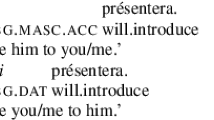
Overview
- Provides new tools and evidence for the modular architecture of the human language faculty.
- Develops a new theory for one of the core issues posed by the Minimalist Program: the relationship of syntax to its interfaces and the nature of uninterpretable features.
- Establishes a new cross-linguistic phenomenon to study the foregoing, person-governed last-resort repairs, providing new insights into the nature of ergative/accusative Case and of Case licensing itself.
Part of the book series: Studies in Natural Language and Linguistic Theory (SNLT, volume 81)
Access this book
Tax calculation will be finalised at checkout
Other ways to access
About this book
Similar content being viewed by others
Keywords
Table of contents (6 chapters)
Reviews
From the reviews:
“Rezac certainly presents an impressive contribution to syntactic theorizing using what are often seen as problematic data. This monograph presents a novel mechanism for PCC and related effects in a number of languages. The work is well organized and contains substantial references. In sum, Rezac’s book is important for anyone interested in the architecture of grammar, minimalism, or Romance syntax.” (Michael Barrie, LINGUIST List 23.4397)
Authors and Affiliations
Bibliographic Information
Book Title: Phi-features and the Modular Architecture of Language
Authors: Milan Rezac
Series Title: Studies in Natural Language and Linguistic Theory
DOI: https://doi.org/10.1007/978-90-481-9698-2
Publisher: Springer Dordrecht
eBook Packages: Humanities, Social Sciences and Law, Social Sciences (R0)
Copyright Information: Springer Science+Business Media B.V. 2011
Hardcover ISBN: 978-90-481-9697-5Published: 30 November 2010
Softcover ISBN: 978-94-007-3429-6Published: 02 January 2013
eBook ISBN: 978-90-481-9698-2Published: 12 November 2010
Series ISSN: 0924-4670
Series E-ISSN: 2215-0358
Edition Number: 1
Number of Pages: XVII, 326
Topics: Linguistics, general, Syntax



